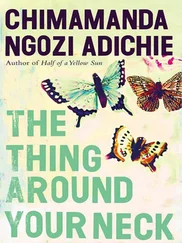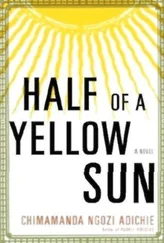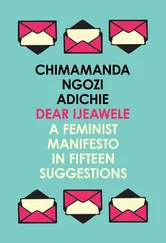Chimamanda Ngozi Adichie
Americanah
This book is for our next generation, ndi na-abia n’ iru:
Toks, Chisom, Amaka, Chinedum, Kamsiyonna, and Arinze.
To my father in this, his eightieth year.
And, as always, for Ivara.
Princeton, in the summer, smelled of nothing, and although Ifemelu liked the tranquil greenness of the many trees, the clean streets and stately homes, the delicately overpriced shops, and the quiet, abiding air of earned grace, it was this, the lack of a smell, that most appealed to her, perhaps because the other American cities she knew well had all smelled distinctly. Philadelphia had the musty scent of history. New Haven smelled of neglect. Baltimore smelled of brine, and Brooklyn of sun-warmed garbage. But Princeton had no smell. She liked taking deep breaths here. She liked watching the locals who drove with pointed courtesy and parked their latest-model cars outside the organic grocery store on Nassau Street or outside the sushi restaurants or outside the ice cream shop that had fifty different flavors including red pepper or outside the post office where effusive staff bounded out to greet them at the entrance. She liked the campus, grave with knowledge, the Gothic buildings with their vine-laced walls, and the way everything transformed, in the half-light of night, into a ghostly scene. She liked, most of all, that in this place of affluent ease, she could pretend to be someone else, someone specially admitted into a hallowed American club, someone adorned with certainty.
But she did not like that she had to go to Trenton to braid her hair. It was unreasonable to expect a braiding salon in Princeton — the few black locals she had seen were so light-skinned and lank-haired she could not imagine them wearing braids — and yet as she waited at Princeton Junction station for the train, on an afternoon ablaze with heat, she wondered why there was no place where she could braid her hair. The chocolate bar in her handbag had melted. A few other people were waiting on the platform, all of them white and lean, in short, flimsy clothes. The man standing closest to her was eating an ice cream cone; she had always found it a little irresponsible, the eating of ice cream cones by grown-up American men, especially the eating of ice cream cones by grown-up American men in public. He turned to her and said, “About time,” when the train finally creaked in, with the familiarity strangers adopt with each other after sharing in the disappointment of a public service. She smiled at him. The graying hair on the back of his head was swept forward, a comical arrangement to disguise his bald spot. He had to be an academic, but not in the humanities or he would be more self-conscious. A firm science like chemistry, maybe. Before, she would have said, “I know,” that peculiar American expression that professed agreement rather than knowledge, and then she would have started a conversation with him, to see if he would say something she could use in her blog. People were flattered to be asked about themselves and if she said nothing after they spoke, it made them say more. They were conditioned to fill silences. If they asked what she did, she would say vaguely, “I write a lifestyle blog,” because saying “I write an anonymous blog called Raceteenth or Various Observations About American Blacks (Those Formerly Known as Negroes) by a Non-American Black ” would make them uncomfortable. She had said it, though, a few times. Once to a dreadlocked white man who sat next to her on the train, his hair like old twine ropes that ended in a blond fuzz, his tattered shirt worn with enough piety to convince her that he was a social warrior and might make a good guest blogger. “Race is totally overhyped these days, black people need to get over themselves, it’s all about class now, the haves and the have-nots,” he told her evenly, and she used it as the opening sentence of a post titled “Not All Dreadlocked White American Guys Are Down.” Then there was the man from Ohio, who was squeezed next to her on a flight. A middle manager, she was sure, from his boxy suit and contrast collar. He wanted to know what she meant by “lifestyle blog,” and she told him, expecting him to become reserved, or to end the conversation by saying something defensively bland like “The only race that matters is the human race.” But he said, “Ever write about adoption? Nobody wants black babies in this country, and I don’t mean biracial, I mean black. Even the black families don’t want them.”
He told her that he and his wife had adopted a black child and their neighbors looked at them as though they had chosen to become martyrs for a dubious cause. Her blog post about him, “Badly-Dressed White Middle Managers from Ohio Are Not Always What You Think,” had received the highest number of comments for that month. She still wondered if he had read it. She hoped so. Often, she would sit in cafés, or airports, or train stations, watching strangers, imagining their lives, and wondering which of them were likely to have read her blog. Now her ex-blog. She had written the final post only days ago, trailed by two hundred and seventy-four comments so far. All those readers, growing month by month, linking and cross-posting, knowing so much more than she did; they had always frightened and exhilarated her. SapphicDerrida, one of the most frequent posters, wrote: I’m a bit surprised by how personally I am taking this. Good luck as you pursue the unnamed “life change” but please come back to the blogosphere soon. You’ve used your irreverent, hectoring, funny and thought-provoking voice to create a space for real conversations about an important subject . Readers like SapphicDerrida, who reeled off statistics and used words like “reify” in their comments, made Ifemelu nervous, eager to be fresh and to impress, so that she began, over time, to feel like a vulture hacking into the carcasses of people’s stories for something she could use. Sometimes making fragile links to race. Sometimes not believing herself. The more she wrote, the less sure she became. Each post scraped off yet one more scale of self until she felt naked and false.
The ice-cream-eating man sat beside her on the train and, to discourage conversation, she stared fixedly at a brown stain near her feet, a spilled frozen Frappuccino, until they arrived at Trenton. The platform was crowded with black people, many of them fat, in short, flimsy clothes. It still startled her, what a difference a few minutes of train travel made. During her first year in America, when she took New Jersey Transit to Penn Station and then the subway to visit Aunty Uju in Flatlands, she was struck by how mostly slim white people got off at the stops in Manhattan and, as the train went further into Brooklyn, the people left were mostly black and fat. She had not thought of them as “fat,” though. She had thought of them as “big,” because one of the first things her friend Ginika told her was that “fat” in America was a bad word, heaving with moral judgment like “stupid” or “bastard,” and not a mere description like “short” or “tall.” So she had banished “fat” from her vocabulary. But “fat” came back to her last winter, after almost thirteen years, when a man in line behind her at the supermarket muttered, “Fat people don’t need to be eating that shit,” as she paid for her giant bag of Tostitos. She glanced at him, surprised, mildly offended, and thought it a perfect blog post, how this stranger had decided she was fat. She would file the post under the tag “race, gender and body size.” But back home, as she stood and faced the mirror’s truth, she realized that she had ignored, for too long, the new tightness of her clothes, the rubbing together of her inner thighs, the softer, rounder parts of her that shook when she moved. She was fat.
Читать дальше












